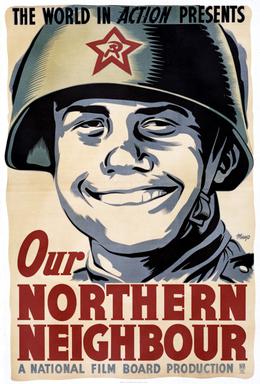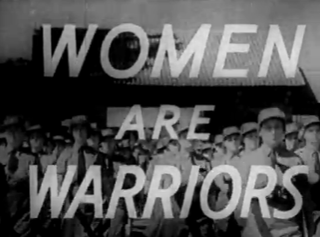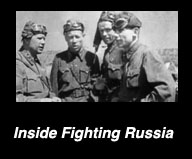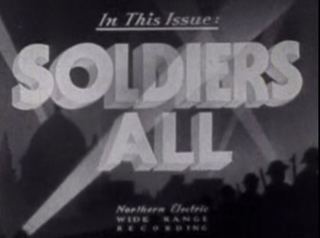
Churchill's Island is a 1941 propaganda film chronicling the defence of Britain during the Second World War. The film was written and directed by Stuart Legg and produced by the National Film Board of Canada (NFB) for the Director of Information, Government of Canada.
Canada Carries On was a series of short films by the National Film Board of Canada which ran from 1940 to 1959. The series was created as morale-boosting propaganda films during the Second World War. With the end of the war, the series lost its financial backing from the Wartime Information Board, but continued as an NFB series of theatrical shorts that included newsreels as well as animated shorts.

Now – The Peace is a film produced and directed in 1945 by Stuart Legg for the National Film Board of Canada series The World in Action, with unaccredited narration by Lorne Greene. Over its nearly 21-minute running time, circumstances during the immediate postwar period following the Second World War, leading to the formation of the United Nations are discussed.

Wasp Wings is a 42-minute 1945 Canadian documentary film made by the Royal Canadian Air Force (RCAF) Overseas Film Unit and the National Film Board of Canada (NFB). The film takes its name from the colourful markings known as invasion stripes that were painted on Supermarine Spitfire fighter aircraft on D-Day, making them look like "angry wasps".

Train Busters is a 13-minute 1943 Canadian documentary film, directed by Sydney Newman. The film was made by the Royal Canadian Air Force (RCAF) Overseas Film Unit and the National Film Board of Canada (NFB) as part of the NFB's Canada Carries On series. Train Busters depicts the Allied night-bombing campaign over German-occupied Europe that was complemented by close air support missions flown by the RCAF targeting enemy trains.

Our Northern Neighbour is a film produced in 1944 by Stuart Legg and directed by Tom Daly for the National Film Board of Canada series The World in Action. The film is narrated by broadcaster Lorne Greene.

Target - Berlin is a 15-minute 1944 Canadian documentary film, made by the National Film Board of Canada (NFB) as part of the wartime Canada Carries On series. The film was produced by Raymond Spottiswoode and directed by Ernest Borneman, from a story by Leslie McFarlane, based on the industrial production of the Avro Lancaster in Canada, from initial production to the first example taking part in a raid on Berlin. The film's French version title was Objectif Berlin.

Everywhere in the World is a 16-minute 1941 Canadian documentary film about the contributions of the United States and Commonwealth countries to the Allied war effort. The film was made by the National Film Board of Canada (NFB) as part of the wartime Canada Carries On series. It was produced by Stuart Legg. The film's French version title was Partout au monde.

The Home Front is a 10-minute 1940 Canadian documentary film, made by the National Film Board of Canada (NFB) as part of the wartime Canada Carries On series. The film was produced and directed by Stanley Hawes.

Women Are Warriors is a 14-minute 1942 Canadian documentary film, made by the National Film Board of Canada (NFB) as part of the wartime Canada Carries On series, and dealt with women in war. The film was produced by Raymond Spottiswoode and written and directed by Jane Marsh. The film's French version title is Les Femmes dans la mêlée.

Inside Fighting Canada is an 11-minute 1942 Canadian documentary film, made by the National Film Board of Canada (NFB) as part of the wartime Canada Carries On series. The film, written and directed by Jane Marsh and produced by James Beveridge, was an account of the Canadian military during the Second World War. The film's French version is titled Canada en guerre.

Inside Fighting Russia is a 1942 22-minute Canadian short documentary film produced by the National Film Board of Canada (NFB) for distribution by United Artists, as part of the wartime The World in Action series. The film documents Russia's fight against Nazi Germany during the Second World War. Inside Fighting Russia is produced by Stuart Legg, and narrated by Lorne Greene. The film's French version title is La Russie sous les armes.

Soldiers All is a 20-minute 1941 Canadian documentary film, made by the National Film Board of Canada as part of the wartime Canada Carries On series. The film was directed and produced by Stuart Legg. Soldiers All describes the experiences in 1941 of soldiers, airmen and sailors in Great Britain and Canada during wartime. The film's French version title is Frères d'armes.

The Gates of Italy is a 21-minute 1943 Canadian documentary film, made by the National Film Board of Canada as part of both the wartime Canada Carries On and The World in Action series. The film was written, directed and produced by Stuart Legg and Tom Daly. The Gates of Italy describes the last days of Benito Mussolini's rule over Italy in 1943 during the Second World War.

Trans-Canada Express is a 20-minute 1944 Canadian documentary film, made by the National Film Board of Canada (NFB) as part of the World War II Canada Carries On series. The film was produced by Sydney Newman and directed by Stanley Hawes. Trans-Canada Express documents the importance of the railroad in Canada, emphasizing the use of rail transport during World War II. The film's French version title is D'un océan à l'autre.

Back to Jobs is a nine-minute 1945 Canadian documentary film, made by the National Film Board of Canada (NFB) as part of the postwar Canada Carries On series. The film describes soldiers in the Second World War returning home and back to a civilian life. The French version title of Back to Jobs is Nos soldats reviennent .

The Voice of Action is a 16-minute 1942 Canadian documentary film, directed by James Beveridge and produced by Raymond Spottiswoode. The short film was made by the National Film Board of Canada (NFB) as part of the wartime Canada Carries On series. The Voice of Action describes the importance of the Canadian Broadcasting Corporation (CBC) in the Second World War. The French version title of The Voice of Action is Dynamisme des ondes.

The War for Men's Minds is a 21-minute 1943 Canadian documentary film, made by the National Film Board of Canada (NFB) as part of the wartime The World in Action series. The film was produced by Stuart Legg. The film describes the impact of propaganda from the Axis powers in 1943, during the Second World War. The French version title is À la conquête de l'esprit humain.

Letter from Overseas is a 15-minute 1943 Canadian documentary film, made by the National Film Board of Canada (NFB) as part of the wartime The World in Action series. The film describes the training and operational use of Canadian Army soldiers in 1943 during the Second World War.

Quebec – Path of Conquest is an 11-minute 1942 Canadian documentary film, made by the National Film Board of Canada as part of the wartime Canada Carries On series. The film was directed by Radford Crawley and produced by Raymond Spottiswoode. Quebec – Path of Conquest describes the importance of the province of Quebec to Canada and the Allied war effort during the Second World War. The film's French version title is Québec, tremplin stratégique.



















